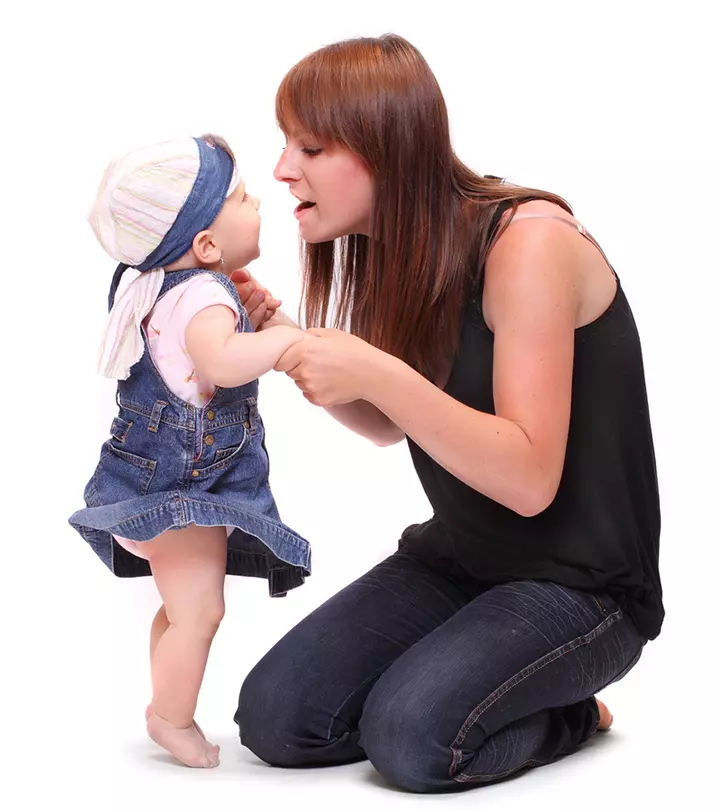
Image: Shutterstock
As a parent, you naturally want the best for your child, and one crucial aspect of their development is language skills. You may have heard the term “word gap”. It is a disparity in the number of words children from different backgrounds hear during their early years. But what if your baby has a word gap? Don’t get worked up yet, because you can make a significant impact on your child’s language development. In this article, we’ll explore what word gap is and provide you with practical ways to nurture your baby’s communication skills. Read on to know more!
Understanding The Word Gap
The word gap is a concept that refers to the difference in the number of words heard by children from various socio-economic backgrounds during their early years. Research has shown that some children hear significantly fewer words compared to others (1). This word gap can have long-lasting effects on a child’s language development and academic success.
Why Does It Matter?
Image: Shutterstock
Building a strong language foundation in your child’s early years is crucial. A rich vocabulary and language skills are essential for them to communicate effectively, learn, and succeed in school and beyond. The word gap can hinder a child’s cognitive and socio-emotional development, making it essential for parents to address it.
Ways To Fill Your Baby’s Word Gap
Image: Shutterstock
Now, let’s dive into some practical steps you can take to fill your baby’s word gap and help them develop strong language skills.
1. Talk, Talk, And Talk Some More
One of the most effective ways to bridge the word gap is simply by talking to your baby. Speak to them as much as you can, even from the moment they’re born. Describe what you’re doing, what’s happening around them, and how they’re feeling. Engage in conversations, no matter how one-sided they may seem at first.
2. Use Real Words And Sentences
Speak in real words and complete sentences when addressing your baby. While baby talk can be cute, it’s more beneficial to use proper language. Your baby learns from hearing words in context and understanding their usage.
3. Read To Your Baby Every Day
Reading is a powerful tool for vocabulary development. Start reading to your baby from a young age, and make it a daily routine. Choose age-appropriate books and discuss the pictures with your child. Reading together not only exposes them to new words but also strengthens your bond.
4. Expand On Their Interests
Pay attention to your baby’s interests and use them as conversation starters. If they’re fascinated by a particular toy or animal, talk about it and encourage their curiosity. This can lead to meaningful conversations that contribute to their language development.
5. Narrate Daily Activities
Image: Shutterstock
When you’re going about your daily routine, narrate what you’re doing. Whether you’re cooking, cleaning, or getting dressed, share your actions and thoughts with your baby. This not only introduces new words but also helps them understand the world around them.
6. Listen Actively
Effective communication is a two-way street. When your baby tries to communicate, whether through coos, gestures, or babbling, listen attentively. Respond to their attempts at conversation, even if you can’t understand them fully. This encourages them to keep trying and reinforces the idea that their words have value.
7. Sing Songs And Rhymes
Singing songs and nursery rhymes can be a fun way to expose your baby to language. The rhythm and melody of songs capture their attention and help with language development. Plus, singing together is a bonding experience.
8. Limit Screen Time
While educational apps and videos can have their place, it’s essential to limit screen time for your baby. Human interaction is far more valuable for language development, so prioritize face-to-face communication.
9. Encourage Questions And Curiosity
As your baby grows, they’ll naturally become more curious about the world around them. Encourage their questions and provide thoughtful answers. This not only enhances their vocabulary but also nurtures their inquisitiveness and critical thinking.
10. Be Patient And Supportive
Image: Shutterstock
Every child develops at their own pace. Be patient and supportive throughout your baby’s language journey. Celebrate their milestones, no matter how small, and provide a safe and nurturing environment for their growth.
11. Connect With Other Caregivers
Building a supportive community with other caregivers can be invaluable. Sharing experiences, tips, and resources can help you stay motivated and informed about the best practices for language development.
12. Seek Professional Help When Needed
If you have concerns about your baby’s language development or suspect a significant word gap, don’t hesitate to seek professional guidance from a pediatrician or a speech therapist. Early intervention can make a significant difference in addressing any potential issues.
Filling your baby’s word gap might feel like one of the most rewarding journeys as a parent. What you are doing today by constantly engaging in a one-way conversation with them will go a long way. By engaging with your child, being present, and creating a language-rich environment, you can ensure that they develop strong language skills!
















